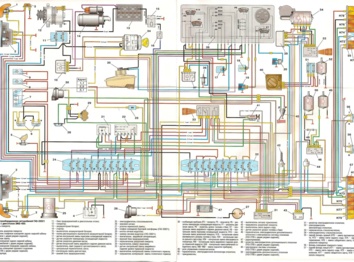Improvement of the suspension of the car based on GAZ-2705

- Added: 30.08.2014
- Size: 515 KB
- Downloads: 2
Description
Project's Content
|
|
|
|
|
|
|
|
|
|
|
|
|
|
|
|
|
|
|
|
|
|
|
|
|
|
|
|
|
|
|
|
|
|
|
|
|
|
|
|
|
|
|
|
|
|
|
|
|
|
|
|
- Kompas or KOMPAS-3D Viewer
- Microsoft Word
Additional information
Contents
ContentsIntroduction
Main part
Definition of suspension characteristic
Calculation of suspension guide
Calculation of lateral stability
Calculation of suspension elements
Calculation of springs
Torsion Point Calculation
Damper Calculation
Stabilizer calculation
Calculation of threaded connection
Calculation of rubber bushing
Suspension mounting technology
Conclusion
List of literature used
Application
1. Introduction
The theme of this course project is "Improvement of the suspension of a sanitary car based on GAZ2705."
Sanitary vehicles are operated under fairly specific conditions, which include constant crossings of single irregularities, such as curbs, tram rails and other obstacles. Also, such cars perform various maneuvers and detours of obstacles.
At the same time, it is necessary to remember that sanitary transport transports people in need of medical care, as well as various medical equipment. It is also necessary to take into account the possibility of providing medical care to patients directly in the car cabin.
Due to these features, sanitary vehicles are subject to the following requirements:
- high power consumption of suspension (for maximum smoothing of single irregularities)
- high smoothness;
- large values of suspension strokes;
- high lateral stability;
- absence of galloping, clues and longitudinal oscillations.
In its existing form, a sanitary car based on the GAZ2705 does not fully meet these requirements, since it has a spring suspension with a low energy consumption. An increase in the energy intensity of such a suspension will be expressed in an increase in its weight, while the stiffness of the suspension and unsprung masses will significantly increase, which will negatively affect the characteristics of the suspension.
My improvement lies in the introduction of an additional elastic element into the existing suspension - a torsion bar with a high energy intensity.
Theoretically, when dividing the initial stiffness of the rear suspension equally between the springs and the torsion bar, the energy intensity of the suspension will increase by 2.5 times (if you consider that the torsion bar has 4 times more energy intensity than the spring), that is, the main requirement for a sanitary vehicle will be satisfied .
Suspension mounting technology
At special workplace install frame, pos. 3, on lifting devices.
Install the brackets of NLG of slot 15 on both frame spars using bolted connections, pos. 283234, brackets of shock absorber, pos.18, using bolted connections, pos. 283234, as well as brackets, pos.16 using bolted connections, pos. 283234. also install brackets of stabilizer pos.17.
Press the support pos.21 in the center of torsion bar pos.25.
Press in torsion bar housing pos.14 of lever bushing pos.11.
Install torsion bar casing on the frame using bolted connections, pos. 283234.
Install the torsion bar in the torsion bar casing, lock it with bolt, p.6.
Install the levers (p.22) through protective rings (pos.13) on the torsion bar. For that lock them against axial displacement by bolts (p.7. install blankings (12).
Suspend the rear ends of springs assembled by pos.4 on the levers by means of bolted connection 313335 through rubber-to-metal hinges, pos.4.
Put the front ends of the springs in the brackets of pos.15 using bolted connection 313335 through rubber-metal hinges of pos.4.
Install shock absorbers pos.1. using nut pos.33 Install brackets pos.18.
Use lifting devices to install the driving axle, pos.2, using straps of springs, pos.14 and ladder pos.24.
Install shock absorbers in lower supports through rubber bushings, pos.8.
Put rubber bushings (pos.9) on the stabilizer (pos.23) and pull it to the brackets using the race of stabilizer (pos.20) and bolted connections (pos. 283234.
Remove the axle supports and make sure that suspension is installed correctly.
Conclusion
So, in my opinion, I managed to develop a fairly workable suspension design.
Disadvantages of this design: the main drawback is that the support of the lever transmitting the moment to the torsion bar is little adapted to the perception of vertical loads from the spring side, which, when diagonally hanging the wheels, can reach a value of about 4 kN. Also disadvantageous is the complex shape of the part pos.22 "Lever," despite the fact that it is the most responsible part of this design.
Advantages of the design:
1. To a greater extent than on the original car, almost all requirements for sanitary transport suspension were satisfied, especially requirements for high energy intensity and transverse stability.
2. Changes made to the design practically do not affect the layout of the car as a whole and can be made on the same platform without designing a new platform.
3. A low complication in the overall design of the rear suspension, despite the fact that the mass of the springs also decreased, that is, the unsprung mass decreased.
![]() графики.cdw
графики.cdw

![]() накладка.cdw
накладка.cdw

![]() опора.cdw
опора.cdw

![]() стремянка.cdw
стремянка.cdw

![]() Общий вид.cdw
Общий вид.cdw

![]() Сборочный чертеж 1.cdw
Сборочный чертеж 1.cdw

![]() Сборочный чертеж 2.cdw
Сборочный чертеж 2.cdw

![]() Спецификация.spw
Спецификация.spw

Similar materials
- 25.01.2023
- 09.06.2022
- 04.11.2022



















